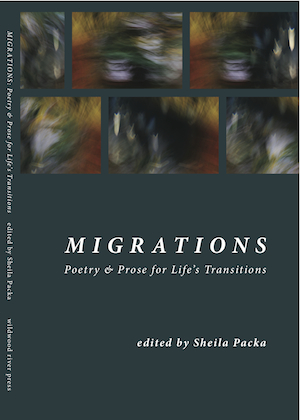book description

Migrations: Poetry & Prose for Life's Transitions features of the work of 75 Lake Superior area and northern Minnesota writers. The book is edited by Sheila Packa, Duluth Poet Laureate 2010-2012. Included are many accomplished writers (Connie Wanek, Ellie Schoenfeld, Deb Cooper, Gary Boelhower, Linda LeGarde Grover, Ryan Vine) and excellent new writers. Each writing captures a moment of change. These changes range from having a new baby to death of a loved one. Some have written about aging, children growing up, illness, bird migration (including a bird being trapped and a bird that doesn't want to migrate), leaving a relationship, moving through violence (several poems, and one specifically about her sister's murder from a domestic violence), and also actual migration (one leaving Argentina during the terror there), and moving back and forth from Minnesota to work in Antarctica. You will love the strong and beautiful collection that shows we are all birds in a larger pattern of migration traveling back and forth from memory to new beginnings.
"The Lake Superior area has either bred or attracted an amazing community of poets, and the best are featured in this diverse collection edited by Sheila Packa. While the title Migrations implied any number of processes to me, I was struck by how many delightfully (or darkly) unexpected topics Ms. Packa had included. Love, childbearing, opening, the creative process, Christmas, aging, divorce, the seasons, Paul Wellstone’s death, all and many more are examined in these luminous poems. Open to any page for the gift of a glimpse into the poet’s mind and heart!
-- Carol Orban, retired teacher, Ely, Minnesota
Sheila Packa's Migrations is the product of a born writer’s craft nourished and shaped by immigrant work ethic and iron will, Finnish music, burning taconite pellets, long northern Minnesota winters, seeing deep patterns in nature and community and literature. With this potent collection of poems and prose she helps us connect with ourselves and one another as a community in the midst of change, movement and radical growth.
-- Ann Wallin Harrington, Family Justice Center Facilitator
Migrations is a marvelous collection of wide-ranging, in-depth reflections in poetry and prose on major existential transitions and reinventions. It conjures up colorful images of weather, flight, birds, water, air, associated with transformations triggered by experiences such as being trapped, going away, bewilderment, violence, aging, loss, death, trauma, emigration, and departures.
-- Tineke Ritmeester, PhD, Associate Professor of Women's Studies at the University of Minnesota-Duluth. She is a Dutch immigrant in transition.
In your hands, you hold a unique collection of high quality poetry and prose by favorite & by newer Lake Superior area writers. Don't set it down! Turn the book over to examine the cover and lift it to smell this ink-and-paper presentation of singular ideas. And know that Migrations follows the primary rule of poetry, reframing details of your world in ways that jolt your consciousness.
-- Cal Benson, author of Dakota Boy
Available in bookstores. ISBN 978-0-9843777-3-2 Distributor: Ingram $15